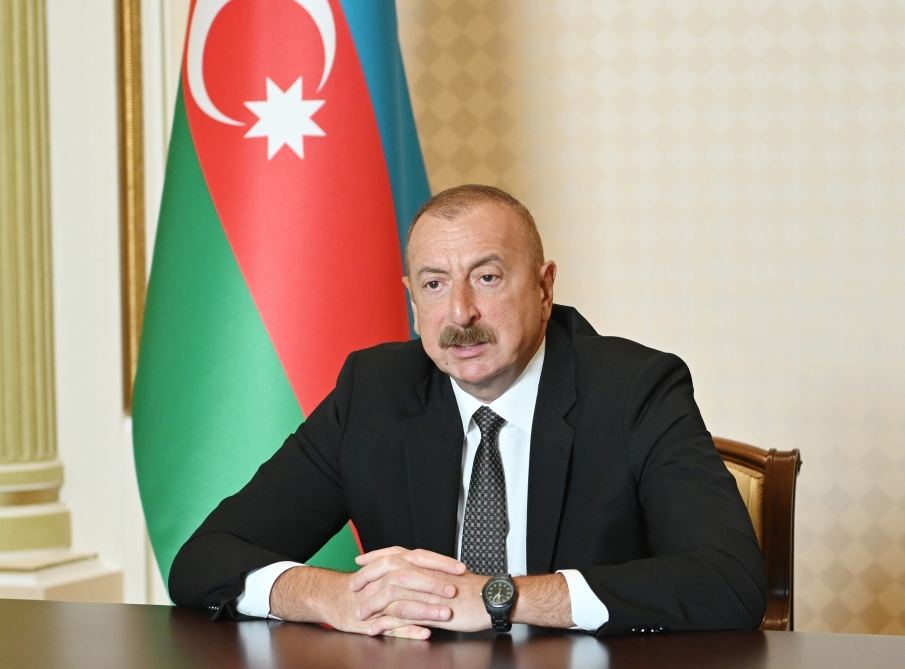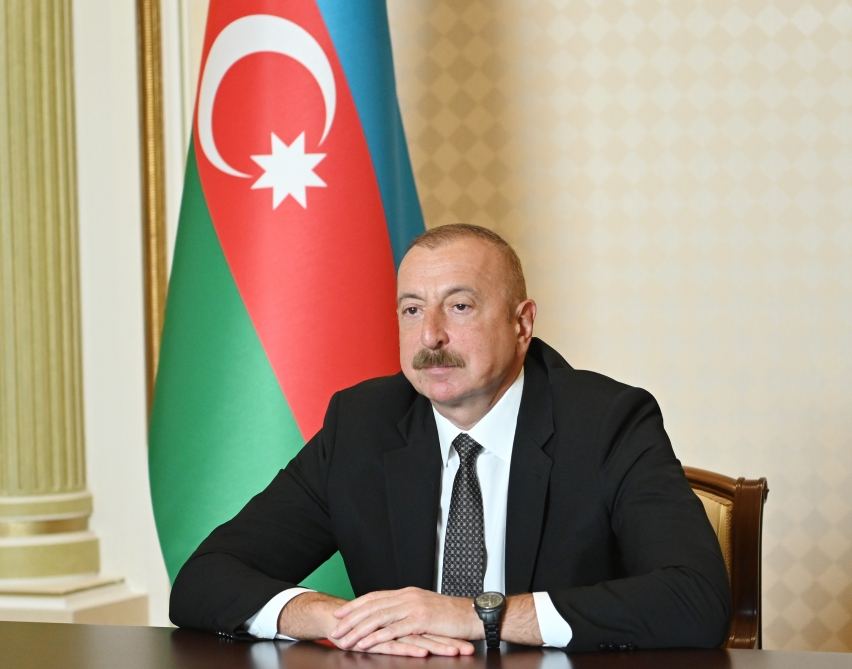BAKU, Azerbaijan, Apr. 5
Trend:
President of the Republic of Azerbaijan Ilham Aliyev has received in a video format Zaur Mikayilov due to his appointment as Chairman of Azerbaijan Melioration and Water Management Open Joint Stock Company.
The head of state made a speech at the video meeting.
Speech of President Ilham Aliyev
- You are being appointed chairman of the Melioration and Water Management Joint-Stock Company. This is one of our priority areas. I have always attached great importance to this area. Today, in the current situation, the importance of this area is growing. Great work has been done in this area in recent years. Major work has been done to repair the old infrastructure because most of it had been built during the Soviet era and fell into disrepair over time. So there was a need for that. At the same time, several large reservoirs were built on my initiative. If these reservoirs had not been built in time, we would have faced major problems in the field of melioration today. At the same time, drinking water supply has always been in the spotlight for the Melioration and Water Management Joint-Stock Company. The company has also implemented several drinking water projects in our country.
I must say that along with irrigation, the Takhtakorpu water reservoir, built on my initiative, is also an important infrastructure facility to provide Baku with drinking water. The construction of the Takhtakorpu-Jeyranbatan water canal created conditions for maintaining the required water level in the Jeyranbatan reservoir. If we take into account the drought of the last two years, it is clear that if the Takhtakorpu reservoir and the water canal had not been built in good time, there would have been a very serious water problem in Baku. The Shamkirchay reservoir was built after the Takhtakorpu one. Thus, tens of thousands of hectares of previously unirrigated land in both the northern and western regions of the country started to be irrigated. This is already manifested in the increase in agricultural production and productivity.
Land reclamation measures are of special importance for each country, especially for those with limited water resources. I want to say again that the construction of reservoirs and water canals has always been a priority among infrastructure projects and this will continue to be the case. Along with all this work, we were, of course, always concerned about the efficient use of water. There are successes in this area, but at the same time, there are difficulties and shortcomings. These must be eliminated. In general, though, the sustainable development of agriculture in recent years is associated, among other things, with the efficiency of water supply. In recent years, we brought water to lands that were not irrigated before. These lands cover hundreds of thousands of hectares. In the past, the supply of water to the lands that had not been watered at all or to partially irrigated lands revitalized them because the water was reaching out to hundreds of thousands of hectares.
Today we are seeing manifestations of this policy in various sectors of agriculture. Some of our large farms dealing with grain production have reached productivity of 50, 60, or even 70 quintals per hectare. This is in line with and equal to the level of leading European countries. Of course, not only irrigation work but also other measures have played a role here, but there is no productivity without irrigation.
In recent years, we have almost revitalized cotton-growing in Azerbaijan. Five to six years ago, cotton growing was completely in ruins as only 20,000-30,000 tons of cotton were harvested in the country. As a result of the measures taken, we achieved a record last year – more than 330,000 tons of cotton were harvested and the yield was more than 33 quintals per hectare. In other words, if we compare this with the most successful years of the Soviet era, we can say that the yield was above 33 quintals per hectare only in two years during the Soviet period. So at the heart of all this is a focused policy and well-concerted activities of relevant agencies. Increasing productivity in agriculture will continue to be a priority for us.
We are now taking specific steps to ensure our food security. The capabilities of our country, the beautiful climate and the existence of several climate zones allow us the opportunity to cultivate many products in Azerbaijan. Increasing productivity will certainly give a greater impetus to this work. We must take into account that the Azerbaijani state is developing fast, that demand is growing and so is the population. Whereas the population of Azerbaijan was 7 million when the Soviet Union collapsed, it is more than 10 million today. So consumption is growing. Of course, agriculture has a special place in the non-oil sector to ensure domestic consumption and increase our export potential. Of course, we cannot talk about any success without irrigation and without the proper organization of work in this area. We can talk a lot about achievements – I have just mentioned a few.
At the same time, one of your tasks is to eliminate shortcomings, apply a modern approach to management and bring modern technologies to our country because we can no longer carry out land reclamation measures, as they say, using primitive methods. The world's most advanced technologies in this area must be brought to Azerbaijan and water must be used efficiently. One of the problems we have is a large amount of losses. In some cases, these losses are natural, but in some cases, they are due to negligence. A lack of accounting, of course, complicates our work. Therefore, full accounting must be ensured. The volume of water entering and leaving our reservoirs was not recorded until a few months ago. We did not have the opportunity to make a correct analysis and forecast. Therefore, reducing losses is one of the most important issues.
The repair and reconstruction of canals is also an important task. The vast majority of canals built in Soviet times were ground canals. Most of them are still in operation today. Of course, ground canals do not enable the transfer of the required quantity of water, and losses occur also because of that. At the same time, this leads to salinization of the soil. Therefore, we must get rid of ground canals. But you have to decide what technologies they will be replaced with. We must establish close contacts with the world's leading companies in this field and benefit from the experience of countries whose climate is similar to ours. There are countries where water resources are less than ours but productivity is much higher. Therefore, all this must be thoroughly investigated, a proper action plan must be developed and, if necessary, a state program must be adopted so that we can apply the world's most modern principles in the field of melioration and irrigation in the coming years.
Some time ago, while investigating this issue, I ordered to prepare and submit proposals on the establishment of new small reservoirs. Such suggestions have been submitted. In principle, I have approved them and there are plans to build 10 new reservoirs. You should look at these issues again and analyze them. Because the construction of each reservoir requires major funds. After that, canals should be built and other measures should be taken. All these funds are provided by the state. However, we need to see how investments in this area are consistent with results. What results do we and will we get in return for this investment? Because if it is not calculated correctly, our work will never be fruitful. The development of this area is another manifestation of the state's attention to the private sector. The state bears all the costs so that farmers and peasants get better crops, create better conditions for themselves and raise their living standards. Given that farmers in the agricultural sector are exempt from all taxes except for the land tax, the development of this sector primarily serves to improve people's living conditions. This is already regarded in Azerbaijan as some kind of a social sphere. But if we take developed countries, we can see that this is not the case – every liter of water is calculated, meters are installed everywhere, accounting is done correctly and results of the investment are calculated from the beginning. We should have the same practices.
We will continue to support our citizens engaged in agriculture. The rising subsidies are further evidence of that. Our intentions and policies remain unchanged. But at the same time, everyone involved in agriculture must understand their responsibility. During the analysis, we came across one thing – cases of unfair distribution of water are widespread. Central executive bodies, local executive bodies and some entrepreneurs seemed to be conspiring and using water unscrupulously. This being the case, some farmers and villages did not have access to water. I issued an order, so the situation is being analyzed now and the investigation is underway. This must be stopped. There are numerous illegal tie-ins on water lines. We came across this during the analysis. It turned out that no one is responsible for this, there is no one accountable for this. This must end. I ordered that visual monitoring of water lines should be carried out. In other words, modern surveillance systems, cameras should be installed in such places and these illegal tie-ins should be stopped.
There are many shortcomings, and you will, of course, analyze all this work during your tenure. Again, this area remains and will remain a priority for us. But there must be a new approach, an approach that meets modern requirements. I think that you will analyze all these issues in a short time and come up with a package of specific proposals.
Another important issue is the implementation of land reclamation measures on liberated lands. We have large water resources in the liberated lands and our water sources generate from there. We have been deprived of these opportunities for many years – for almost 30 years. Armenia pursued a policy of aggression against Azerbaijan in this area too. Environmental terror was organized against us. Deforestation, destruction of reserves – 54,000 hectares of forest were felled, destroyed, looted and stolen by Armenians, and this is a serious crime. All the damage is now being calculated, including this damage. They deprived us of water. The Sarsang reservoir and the Sugovushan reservoir were under their control. These two reservoirs were built by great leader Heydar Aliyev in the 1970s. On his initiative, these reservoirs were built to carry out irrigation work in Aghdam, Tartar, Goranboy, Barda and other districts. The main purpose and function of the Sarsang reservoir were to supply water to these and other districts. At that time, about 100,000 hectares of land were supplied with water from this source and from Sugovushan. It is a smaller reservoir. More than 500 million cubic meters of water were stored in the Sarsang reservoir. But the Armenians cut off our water, deliberately let released it in winter to cause environmental damage and cut off the water in the spring and summer, so we were left without water. We prepared a special action plan for the irrigation of that area, and on my instructions, hundreds of artesian wells were drilled there. However, when we liberated the Sugovushan settlement, we also took control of the Sugovushan reservoir. After Sugovushan came under our control, there was an opportunity to significantly improve the water supply of Aghdam, Tartar, Barda, Goranboy and other districts. However, the canals leading to these districts have not been used for many years. It is necessary to analyze what their condition is now and if there is a need for repair. This work should be examined so that we can make water available to our people without wasting time.
The Khachinchay reservoir is located in Aghdam district, near Fuzuli city, or rather the destroyed Fuzuli city. Groups have already been sent there on my instructions. There are other reservoirs in the liberated lands. All their parameters must be analyzed. Of course, we will use these reservoirs efficiently. After our citizens return to the liberated lands, this will create additional opportunities for them, of course.
At the same time, we have large river resources in the liberated lands. We were deprived of them. Today, our rivers originating in the liberated lands are our main rivers. The Tartarchay originates in the territory of the Kalbajar district. But the contemptible enemy deprived us of the water of the Tartarchay. When I enquired about this problem during my repeated visits to the Karabakh region, I saw that it creates big problems. For example, the water of Tartar was completely cut off. The Tartarchay river was almost dry in many places. Now we have returned to the Tartarchay, to its source. The Bazarchay, which is also called the Bargushad river, the Hakari river, the Okhchuchay – there are many rivers, more than 10 rivers originating there. Their potential must be analyzed. There must be a proper analysis of the river flow and how we can use these rivers effectively. Many of them flow into the Araz River.
You should also examine whether there is a need to build reservoirs in the liberated lands. Of course, our largest source of water in the liberated lands is Khudafarin and Giz Galasi reservoirs on the border with neighboring Iran. These are very large reservoirs. The volume of the Khudafarin reservoir is 1.6 billion cubic meters - it is a very large reservoir. In order to use this reservoir, of course, additional infrastructure projects must be implemented. First of all, canals must be built so that we can take water from these reservoirs to the liberated lands – Zangilan, Jabrayil, Gubadli and other districts, and use it effectively. This has great potential.
The potential of all our water resources both in the liberated lands and in other parts of the country must be carefully analyzed. Specific programs and proposals must be submitted to make the best use of these water resources. So there is a lot to be done in this area, both in the liberated lands and in other areas. The main principle should be modernity, environmental safety and maximum efficiency so that the people of Azerbaijan, those engaged in agriculture see positive changes in their lives. I am sure it will be the case.
Let me repeat that I have always considered this area as a priority in recent years, and a lot has been done to develop it. A large amount of money has been allocated from the state budget. If this had not been done, we would be facing major problems today. But we must not be complacent with these achievements and should bring modern governance practices to this area. When I appointed you to this position, I took into account the fact that there must be modern management everywhere. The recent personnel reforms I have carried out show that. Where there is modern management, modern governance, honesty, purity and conscience, there will be results. By giving these recommendations to you when appointing you to this position, I want to express my confidence that you will justify this high confidence.
Chairman of Azerbaijan Melioration and Water Management Open Joint Stock Company Zaur Mikayilov, said:
- Dear Mr. President, thank you very much. This appointment is a great honor but also a great responsibility for me. I express my deep gratitude to you for this confidence. I want to assure you that I will spare no efforts to justify this confidence and will work hard for our motherland and country.











